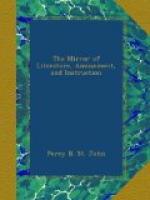“You couldn’t surely wish me to sit by the side of those people, to see such a thing as that?”
“As to being by the side of those people, I must remind you, that it was Lady Gayland’s box in which you were; and that whatever she, with her acknowledged taste and refinement, sanctions with her presence, can only be objected to by ignorance or prejudice. You have still a great deal to learn, my dear Lucy,” added he, more kindly; “and nothing can be so fatal to your progress in that respect, as your attempting to lead, or to find fault, with what you do not understand.”
“But surely I can understand that it is not right to do what I saw that woman do,” interrupted Lucy, presuming a little more doggedly than she usually ventured to do on any subject with her husband; for this time she had been really shocked by what she had seen.
“Wrong it certainly is not, if you mean moral wrong. As to such an exhibition being becoming or not in point of manners, that depends entirely upon custom. Many things at your father’s might strike me as coarseness, which made no impression upon you from habit, though much worse in my opinion than this presumed indecorum. Those things probably arose from ignorance on your parts, which might be corrected. This, on the other hand, from conventional indifference, consequent on custom, which it is not in you to correct. Depend upon it you will only get yourself laughed at, and me too, if you preach about dancers’ petticoats.”
“I don’t want to preach to any body; and you know how much it fashes me to contend with you.”
“Don’t say FASHES, say distresses, or annoys, not fashes, for heaven’s sake, my dear Lucy.”
“Oh, dear, it was very stupid of me to forget it. That was one of the first things you taught me, and it is a many days since I said it last; but it is so strange to me to venture to differ with you, that I get confused, and don’t say any thing as right as I could do. Even now I should like to ask, if modesty is a merit, whether nakedness ought to be a show; but I’ll say no more, for I dare say you won’t make me go there again.”
“No, that will be the best way to settle it.”
The plot of the Contrast is not, as the reader may perceive, one of fashionable life: it has more of the romance of nature in its composition: the characters are not the drawling bores that we find in fashionable novels, though their affected freaks are occasionally introduced to contrast with unsophisticated humility, and thus exhibit the deformities of high life. The whole work is, however, light as gossamer: we had almost said that a fly might read it through the meshes, without endangering his patience or liberty.
* * * * *




